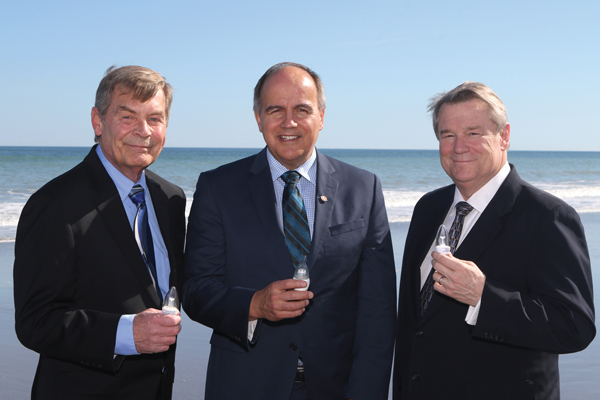Kennedy Space Center, FL & Fredericton, NB: Hydrogen technology developer Joi Scientific and New Brunswick Power announced February 26 that they will co-develop a hydrogen production system to enable “the world’s first electricity grid that uses hydrogen as a baseload resource.”
 Left to right: Rob Koeneman, co-founder, President and Sr. VP Technology, Joi Scientific; Gaetan Thomas, CEO, NB Power; Traver Kennedy, CEO, Joi Scientific.
NB Power says it is re-designing its operations to create a highly efficient and greener electricity grid. The collaboration envisages the deployment of Joi Scientific’s proprietary Hydrogen 2.0™ production system at multiple distributed stations alongside wind turbines, hydro, and nuclear power sites to create a net-zero carbon-generating power operation while maintaining “low and stable rates.” New Brunswick does not benefit from large amounts of storage capacity in its hydroelectric facilities. The joint commercial development between Joi Scientific and NB Power foresees the utility offering its emissions-free grid architecture, which combines distributed Hydrogen 2.0 baseload generation with smart grid management, to other utility operators across North America and beyond.
Left to right: Rob Koeneman, co-founder, President and Sr. VP Technology, Joi Scientific; Gaetan Thomas, CEO, NB Power; Traver Kennedy, CEO, Joi Scientific.
NB Power says it is re-designing its operations to create a highly efficient and greener electricity grid. The collaboration envisages the deployment of Joi Scientific’s proprietary Hydrogen 2.0™ production system at multiple distributed stations alongside wind turbines, hydro, and nuclear power sites to create a net-zero carbon-generating power operation while maintaining “low and stable rates.” New Brunswick does not benefit from large amounts of storage capacity in its hydroelectric facilities. The joint commercial development between Joi Scientific and NB Power foresees the utility offering its emissions-free grid architecture, which combines distributed Hydrogen 2.0 baseload generation with smart grid management, to other utility operators across North America and beyond.
Joi Scientific’s Hydrogen 2.0 technology uses a “high-efficiency, high-throughput” system to liberate hydrogen from untreated seawater. Hydrogen 2.0 will enable the localized production of hydrogen on-site, on-demand, meaning that it can be generated when and where it is needed, closer to where customers are located, with a feedstock generated from readily available coastal seawater.
“NB Power has long been committed to investing in the sustainability of our province’s energy future. We are encouraged with the progress made to date on Hydrogen 2.0 and are looking forward to the next phase of co-development,” said Gaëtan Thomas, the President and CEO of NB Power. “Hydrogen 2.0 has the potential to provide a localized, on-demand hydrogen production capability which, when mixed with other renewable sources such as wind and hydro, gets us closer to our customers by delivering zero-carbon loads at lower cost and greater efficiency.”
The new development phase follows successful third-party verifications of Hydrogen 2.0 technology efficiency and throughput by scientific institutions and experts. Both companies are planning to work closely together to co-develop and test a commercial prototype unit at Joi Scientific’s labs at the Kennedy Space Center.
The development phase follows an initial license agreement that was signed in 2016, granting NB Power the rights to develop, manufacture, use, and sell hydrogen and hydrogen generation systems for large and small electric utility applications using Joi Scientific’s Hydrogen 2.0 technology.
“This historic agreement with NB Power signals the transition of our Hydrogen 2.0 technology from the laboratory into full-scale development and commercialization,” said Traver Kennedy, CEO, Joi Scientific. “New Brunswick is a prime example of what can be achieved by a far-sighted, ecologically-minded institution. Their innovative approach for realizing a new zero-carbon distributed grid architecture could provide the blueprint for the way the world generates and consumes electricity going forward.”
The systems being developed by NB Power compete with a number of other technologies for extracting hydrogen from water and for generating electricity from hydrogen. Companies active in the use of hydrogen as an energy medium have made significant progress in recent years. IPPSO FACTO plans to provide further reports on this growing sector in future issues.
See also the related story “Southern Ontario partners propose hydrogen as energy storage,” elsewhere this issue.
